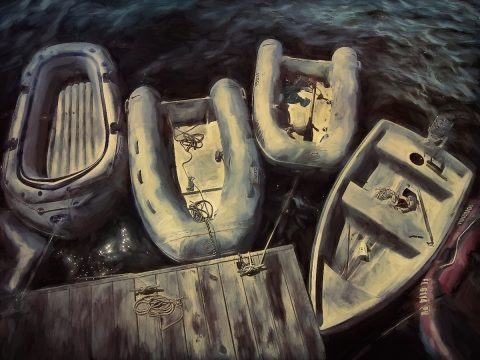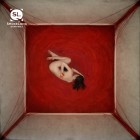This story has a fable-like quality to it. Did you set out to write a modern Aesop fable of sorts, or did you just think, “I’m going to write about some wolves,” and it snowballed from there?
Ha, just wanted to write about some sewer wolves. But everything feels like a fable these days. The dark part of the fable. The haunted forest. Rapunzel locked in a room until she spins her hair into gold, and she’s trying but it’s not working. How could it, given what the bonkers king gave her? Society feels lousy right now, it needs its head shaved.
For this story, I was stuck on the pros and cons of being raised by wolves rather than like, ya know, Republicans. Rather than by narcissists. Rather than by people without any empathy for someone even slightly different than themselves.
Real question, then…why would wolves bother to raise a shitty kid?
I think it’s well-documented that you write on your phone during breaks at the refinery, but can you let us into your process here with this story? How does the NYC living, refinery-working man get to thinking about wolves?
I wrote the first draft as a status update on the Facebook app. Careless. On the fly and posted it quick. Status updates aren’t supposed to be art. So that’s fun.
The story really started on Twitter. I was thanking a writer friend, who said, “Don’t worry about it, happy to help with anything…”
I wrote back, “What if I find a baby out in the snow. Will you help me raise it?”
And then later on in the message chain there were complaints about having to hang out with family and the friend wrote, “I have to keep family time short and sweet. It’s like slot machines …”
So I wrote back “Wouldn’t it be great to be raised by wolves?”
Then I was picturing wolves having to go to PTA meetings. Wolves having to take their abducted human babies to tee ball practice. I figured the first time a wolf showed up at tee ball practice some other parent with a magnum .357 would gun the wolf down…so it all changed. It went underground.
The story just grew from there. Basically I really like writing about animals as long as I don’t have to make them talk. I like writing about humans if I can have them weep.
“Wolves” touches on so much—the ideas of forced change/assimilation, refugees, forgetting, modernization, and so many others really drive this piece. Writers often dismiss analysis of metaphor in their work—those things that linger for the reader are for the reader to discover, and it’s not the job of the writer to talk about those things. So, with that in mind, tell us about “Wolves” and the metaphors you created. Were they intentional?
The world feels really sad, really beaten up, kicked in the stomach right now. But everywhere I look there are patches of living creatures refusing to be told no. They’re going to make life work for them, even if society is putting up an “impossible” wall against them. Nobody has all the answers, but they are going to do whatever they can to find a better life.
During our correspondence before this interview, you mentioned you are working on a new novel. Tell us more about that.
The novel is realist, like my previous novel F250. It’s about a 17-year-old kid who is separated from his father at the outbreak of war, post-911 terror attacks. The kid has to grow up quick and bounces around from a bunch of heavy labor jobs, trying to feed and house himself, and figure out how bad a thing it was that he stole his only close friend’s girl. The novel also has a lot to do with poverty, racism, nationalism, and sex.
That definitely sounds realist! How much of your realist writing draws on autobiography?
Slim to none of this novel is autobiographical. But other times I’ve written about experiences I’ve had. I don’t know, this year besides short stories and poems, I started writing more straight up memoir. I have a book coming out from CCM in May called Work Safe Or Die Trying that is about working heavy construction and my family, and my friends. I think once I started truthfully writing about my own life I’ve felt less inclined to stick pieces of my life into a novel.
Writing novels vs. short stories. Thoughts?
It’s all the same to me. It’s all just a project that takes a certain amount of time. Some projects take a few days, a flower grown from a seed. Others take years, a seed into a tree.
I once did an oral report on wolves in 9th grade and consider myself something of an authority. What are your views on wolves? Which is your favorite and why?
I love dogs and wolves are super dogs. Wolves are misunderstood and feared in real life. It’s so strange to think that humans customized this animal. Transformed a wolf into a dog, and made the wolf bend to society’s various needs. They’re also my favorite creature in make-believe because they are so conflicted and complicated. The wolf in sheep’s clothing. The big bad wolf. The werewolf.
If you found a baby wolf, would you raise it as your own?
I’d have to take it on a wolf-by-wolf basis.



 The core workshop of SmokeLong Fitness is all in writing, so you can take part from anywhere at anytime. We are excited about creating a supportive, consistent and structured environment for flash writers to work on their craft in a community. We are thrilled and proud to say that our workshop participants have won, placed, or been listed in every major flash competition. Community works.
The core workshop of SmokeLong Fitness is all in writing, so you can take part from anywhere at anytime. We are excited about creating a supportive, consistent and structured environment for flash writers to work on their craft in a community. We are thrilled and proud to say that our workshop participants have won, placed, or been listed in every major flash competition. Community works.